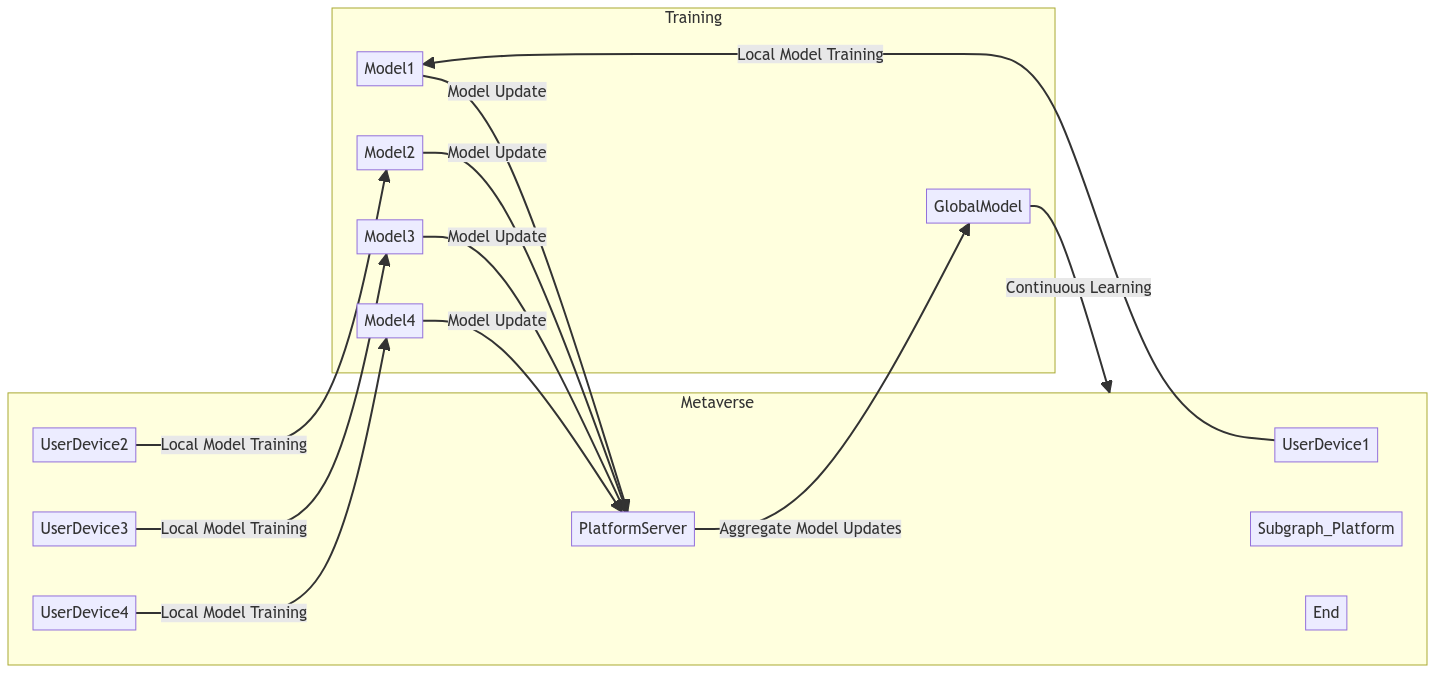By: Himanshu Tiwari, International Center for AI and Cyber Security Research and Innovations (CCRI), Asia University, Taiwan, nomails1337@gmail.com
Introduction
The Metaverse is rapidly evolving right into a virtual global wherein people and businesses engage, create, and conduct commercial enterprise. This digital realm, built on the basis of augmented and digital facts, is taking the idea of the internet to new heights. However, this boundless digital realm calls for novel strategies for data control and privacy. Federated Learning, a decentralized system mastering method, emerges as a promising strategy to address the challenges of information privacy and collaboration within the Metaverse.
The Metaverse Challenge

As the Metaverse expands, so does the quantity of information generated inside this immersive digital space. This data encompasses everything from consumer interactions and options to spatial mapping and object popularity. While these records are priceless for reinforcing consumer studies and permitting AI-driven packages, they also raise important concerns about facts, privacy and safety.
In a centralized model, where facts are gathered and processed on a single server or platform, the hazard of facts breaches and misuse is good sized. With the Metaverse’s global attain, it becomes vital to increase a greater steady and privateness-aware approach to information coping.
Federated Learning: The Solution

Federated Learning gives a novel way to address those challenges. In this approach, device getting-to-know models are trained collaboratively throughout a decentralized community of gadgets or servers without the want to percentage uncooked data. It ensures that touchy statistics remain on customers’ devices, improving privacy and safety.[1]
Here’s how Federated Learning works in the Metaverse context [3]:
1. Privacy Preservation: In a federated learning setup, man or woman records are stored on users’ devices or servers, and only version updates are shared. This continues to keep touchy user statistics private, reducing the chance of facts breaches.
2. Collaboration: Multiple events, such as Metaverse platform vendors, builders, and customers, can collaborate on schooling machine learning fashions without exposing their statistics to every difference. This collaboration fosters innovation even as safeguarding statistics.
3. Local Model Training: Each device or server in the community plays neighbourhood version training on its records. Afterwards, model updates are aggregated at a central server, and an international model is constructed. This international model represents a collective understanding of the information while ensuring that personal data remains personal.
4. Continuous Learning: Federated Learning permits the model to study constantly as new records are generated inside the Metaverse. This is essential for adapting to user choices and evolving trends.
Advantages of Federated Learning within the Metaverse [2]
1. Data Privacy: Users maintain control over their information, reducing privacy issues and enhancing belief within the Metaverse.
2. Security: With information saved domestically, the hazard of big-scale fact breaches is appreciably reduced.
3. Collaboration: Developers, platform companies, and users can paint collectively to improve AI fashions while preserving data confidentiality.
Four. Scalability: As the Metaverse grows, Federated Learning lets in for efficient and dispensed model training, adapting to the increasing volume of statistics.
5. Personalization: Continuous learning enables AI applications to provide increasingly personalized studies, mainly to better personal delight.
Challenges and Considerations
Despite its promise, Federated Learning comes with its own set of demanding situations and concerns in the Metaverse:
1. Network Latency: The disbursed nature of Federated Learning may additionally introduce network latency, impacting the real-time nature of the Metaverse.
2. Model Complexity: Managing complex systems and getting to know fashions across a decentralized community requires superior infrastructure and algorithms.
Three. Incentives: Ensuring that individuals have the right incentives to make contributions to the federated and gaining knowledge of technique is important.
Conclusion
The Metaverse is getting ready to transform the way we interact with the virtual world. To harness its full ability, information privacy, security, and collaboration need to be at the leading edge. Federated Learning gives an effective solution that balances these necessities, permitting customers to experience the immersive enjoyment of the Metaverse while retaining their facts ‘ privacy. As this generation matures, the Metaverse stands to become a more secure, extra-inclusive, and innovative digital space for everyone.
Reference:
- Kang, J., Ye, D., Nie, J., Xiao, J., Deng, X., Wang, S., … & Niyato, D. (2022, August). Blockchain-based federated learning for industrial metaverses: Incentive scheme with optimal Aoi. In 2022 IEEE International Conference on Blockchain (Blockchain) (pp. 71-78). IEEE.
- Zeng, Shenglai, Zonghang Li, Hongfang Yu, Zhihao Zhang, Long Luo, Bo Li, and Dusit Niyato. “Hfedms: Heterogeneous federated learning with memorable data semantics in the industrial metaverse.” IEEE Transactions on Cloud Computing (2023).
- Chen, Y., Huang, S., Gan, W., Huang, G. and Wu, Y., 2023. Federated Learning for Metaverse: A Survey. arXiv preprint arXiv:2303.17987.
- Xu, Z., He, D., Vijayakumar, P., Gupta, B., & Shen, J. (2021). Certificateless public auditing scheme with data privacy and dynamics in group user model of cloud-assisted medical WSNs. IEEE Journal of Biomedical and Health Informatics.
- Liu, R. W., Guo, Y., Lu, Y., Chui, K. T., & Gupta, B. B. (2022). Deep network-enabled haze visibility enhancement for visual IoT-driven intelligent transportation systems. IEEE Transactions on Industrial Informatics, 19(2), 1581-1591.
- Zhou, Z., Li, Y., Li, J., Yu, K., Kou, G., Wang, M., & Gupta, B. B. (2022). Gan-siamese network for cross-domain vehicle re-identification in intelligent transport systems. IEEE Transactions on Network Science and Engineering.
- Zhang, Q., Guo, Z., Zhu, Y., Vijayakumar, P., Castiglione, A., & Gupta, B. B. (2023). A deep learning-based fast fake news detection model for cyber-physical social services. Pattern Recognition Letters, 168, 31-38.
- Deveci, M., Gokasar, I., Pamucar, D., Zaidan, A. A., Wen, X., & Gupta, B. B. (2023). Evaluation of Cooperative Intelligent Transportation System scenarios for resilience in transportation using type-2 neutrosophic fuzzy VIKOR. Transportation Research Part A: Policy and Practice, 172, 103666.
Cite As
Tiwari H. (2023) A Federated Learning Approach to the Metaverse: Unlocking the Power of Data Privacy and Collaboration, Insights2Techinfo, pp.1